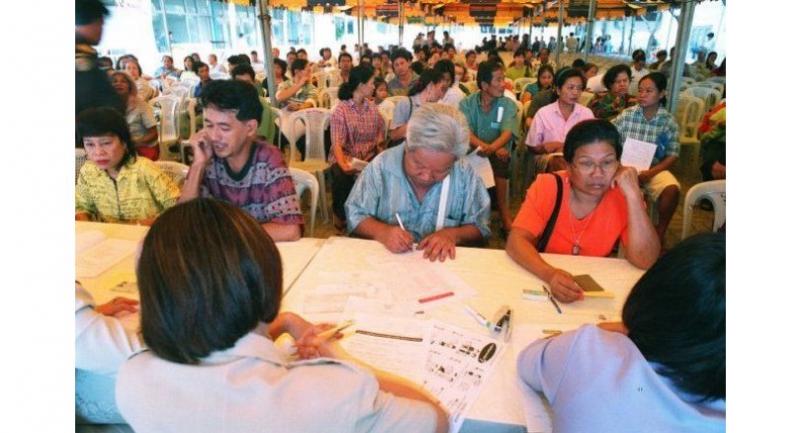Pracharat bill ‘a setback for goal of a welfare state’

Subsidising only a part of population won’t ease economic disparity: critics
THE LAW endorsing the government’s welfare-card project will become a major obstacle – not a boost – to the welfare-state goal, a co-founder of the Future Forward Party has warned.
“The name ‘Provision of Pracharat Welfare for Grassroots Economy and Society Bill’ is misleading,” the party’s Sustarum Thammaboosadee said.
A lecturer at Thammasat University’s Interdisciplinary Studies College, he said the bill in essence embraced the concept of “assistance” to the underprivileged.

“The bill, if enforced, will replace state-provided welfare with a practice of the rich helping the poor,” he said. “It would promote the concept of giving out of pity if it were embraced as a way to reduce gaps in Thai society.”
Sustarum believes such a concept would hurt people’s dignity and camouflage the fact that big gaps exist because the elite have monopolised the economy and taken too much from it.
“If the government really intends to raise the quality of life of the majority population, it must focus on structural solutions – not on just some aspects of help,” he said. “So many Thais are poor, and not because they’re not smart or don’t work hard enough.”
The Provision of Pracharat Welfare for Grassroots Economy and Society Bill sailed through the first reading in the National Legislative Assembly on September 13. The bill aims to deliver subsidies to low-income earners via the government’s welfare-card project and prescribes the establishment of a fund to support the project.
If established, the fund will operate under the Finance Ministry, with the ministry’s permanent secretary serving as its chairperson. It will receive startup capital from the government but will also accept donations.
Sustarum says the fund will only manage to get a slice of money needed to close the wealth gap in Thai society and as a result will fail to respond to Thailand’s actual needs.
“To speak the truth, we need to challenge the current economic and political structure,” Sustarum said. “I also notice that the board of the yet-to-be-established fund will be dominated by civil servants.”
The welfare-card project kicked off with the registration of low-income earners – people earning less than Bt100,000 a year. At present, there are 11.67 million registered low-income earners in Thailand.
Since last year, the government has provided them with monthly subsidies and other support. For example, they can get between Bt200 and Bt300 in grocery allowances every month. Those living in Bangkok can also get Bt500 towards bus and MRT fare, while those living outside the capital can get up to Bt500 for train and bus fare.
Starting last month, the government also allowed registered low-income earners to withdraw Bt200 in cash every month with the welfare card, if they earn less than Bt30,000 a year. The cash quota is limited to Bt100 if they earn more.
“At first glance, the project sounds good. Many people will think that, no matter how small the assistance, it’s better than no help at all. Beneficiaries of the welfare-card project thus will oppose anyone who tries to scrap it,” Nimit Tien-udom said in his capacity as representative for the People’s Network for State Welfare.

“But the problem is that the meagre amount of subsidies cannot really improve their quality of life.”
In his opinion, the government must promote fair allocation of income so as to ensure that people could earn enough to live on.
He believed tax reform would be one solution.
“The government should then be able to allocate enough tax income to operate a welfare state,” he said.
Nimit said the Provision of Pracharat Welfare bill showed the government did not believe in universal welfare – state welfare for all.
“This bill shows that the government intends to provide help to just specific groups of people. Since the delivery of help can be selective, politicians will be able to use the state assistance as a political tool,” he said.

Prime Minister General Prayut Chan-o-cha’s government this year approved more than Bt40 billion for welfare-card initiatives.
Nattaporn Jatusripitak, an adviser to the PM’s Office Minister, said the fund for the Pracharat Welfare bill would also allow various sectors to contribute to the provision of welfare.
“Once the fund is established, there will be an initial Bt2.73 billion and donations can come from international organisations,” he said. The bill for the establishment of the fund got the Cabinet green light last month.

Rangsit University vice president Dr Anusorn Tamajai said that, while it would be good to mobilise resources from the private sector, it could be hard to keep budget use in check later on.
He also disliked the fact that civil servants via the fund’s board could dictate what to give to specific groups of people.
“This means the state-people relationship will be vertical, not horizontal. It would also mean that the state does not treat all people equally,” Anusorn said. “In fact, we should move towards the welfare-state goal and embrace policies that benefit all, not just some people.”

Monthly Benefits from Welfare Cards
- Grocery allowance of Bt300/Bt200 for use at participating shops;
- Bt500 travel allowance for buses/MRT/train;
- Bt45 cooking-gas subsidy;
- Bt200/Bt100 cash allowance.
PLUS
- VAT refund
- Free vocational training
Proposed Additional Benefit
- Free 4G Internet access
Source: The Nation
